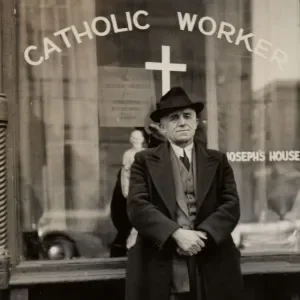The Dignity of Workers
The Catholic Worker movement began in 1933, when journalist Dorothy Day teamed up with French immigrant Peter Maurin during the depths of the Great Depression. Day brought her pen; Maurin brought his ideas. Together, they launched a penny newspaper and built a movement grounded in mercy, justice, and community.
What It Was
Maurin’s contribution was to distill Catholic social teaching—especially the papal encyclicals Rerum Novarum (1891) and Quadragesimo Anno (1931)—into three practical proposals:
Each was a way of rebuilding social life from the ground up, balancing reflection with action, and putting human dignity at the center.
Why It Mattered
The Catholic Worker emerged in a moment of crisis: mass unemployment, urban displacement, collapsing farms, and the rise of authoritarianism. Institutions were failing the poor, and political slogans offered little clarity. Maurin and Day insisted that dignity could not wait on better systems—it had to be practiced immediately, in daily life.
The Catholic Worker became a living critique of both unchecked capitalism and faceless bureaucracy. It showed that ordinary people could take responsibility for one another through hospitality, shared labor, and honest conversation.
The Spirit Behind It
At its heart, the Catholic Worker was animated by:
Personalism: treating each person as a unique image of God, not as a number or a case.
Voluntary poverty: living simply to stand with the poor.
Integration of thought and action: not separating intellectual life from manual work or moral reflection.
Community as resistance: small groups practicing a different way of living, even in the shadow of global crises.
Carrying It Forward
Almost a century later, many of the fractures Maurin named remain with us: inequality, alienation, and the loss of meaningful work. The Catholic Worker’s vision speaks into these cracks with startling freshness.
At The Chapter House, we take inspiration from this tradition. We call ourselves a work/shop—a place where workers and shoppers meet on common ground. Here, trade is not just about transactions but about relationship. Books and conversations clarify thought. Hospitality welcomes neighbor and stranger. The dignity of work is honored not only in what we produce but in how we gather.
By reviving Maurin’s ideas in a new form, we hope to stitch together reflection and practice, commerce and community, creation and craft—so that the work of our hands and the words of our mouths both testify to a society built on dignity.

